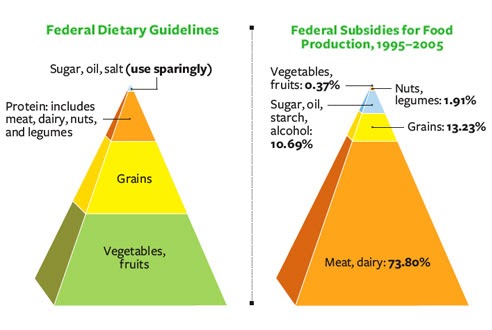The U.S. government provides subsidies for commodity crops such as corn, soy, and wheat, which are often used as ingredients in processed and junk foods. These subsidies contribute to the high rates of obesity and related health problems in the U.S..
A 2016 study by the Union of Concerned Scientists found that the U.S. government spent $18 billion on subsidies for commodity crops in 2015, and that a significant portion of these subsidies went towards the production of unhealthy foods. The study also found that these subsidies disproportionately benefited large, industrial farms and contributed to the consolidation of the agriculture industry.
These subsidies have negative impacts on small farmers and the local food system by creating an uneven playing field for small farmers, who often struggle to compete with the large, subsidized farms that dominate the market.
- The U.S. food system is heavily reliant on commodity crops and processed foods which are supported by government subsidies that contribute to the production and consumption of unhealthy foods. Eliminating the junk food subsidy system and redirecting support towards healthier and more sustainable agriculture practices can have significant benefits for public health and the environment.
- Food subsidies disproportionately benefit producers of unhealthy items like corn and soy, which are used to make sweeteners and animal feed. These products are often used in processed and junk food.
- The subsidies create a cheaper price for these products, making unhealthy options more affordable and therefore more appealing to consumers.
- The subsidies also discourage the production of healthier options, like fruits and vegetables, which are not as heavily subsidized.
- The lack of access to healthy, affordable food in low-income communities has been linked to higher rates of diet-related diseases like obesity, diabetes, and heart disease.
- The government should eliminate junk food subsidies and enable taxpayers to redirect their own money towards healthier options, in order to improve public health and address the problem of diet-related diseases.
- Billions of dollars can be redirected to increase funding for initiatives that improve access to healthy food such as farmers markets, community gardens, and grocery stores in food deserts.
Addressing the issues of our food system will require a multifaceted approach that involves eliminating government subsidies for junk food that incentivizes unhealthy eating habits and increasing community efforts to improve access to healthy food.
News
Mainstream News
- Billions In Farm Subsidies Underwrite Junk Food, Study Finds – HuffPost
- Consumer Advocacy Group- Cut Federal Subsidies For Junk Food – CBS Chicago
- Farm subsidies waste money on junk food – Washington Examiner
- Federal Government Supports Junk Foods: Study – Newsmax.com
- Foods from subsidized commodities tied to obesity – Reuters
- How the Government Supports Your Junk Food Habit – The New York Times
- Junk Food Subsidies Threaten American Health (Op-Ed) – Live Science
- Processed Food and Government Subsidies Linked to Obesity – Time
- Report sheds light on junk food subsidies – Wisconsin Radio Network
- Report- Subsidies Fund Junk Food – Georgia Public Broadcasting
- U.S. Junk Food Subsidies Since 1995 Equal To Cost Of Nearly 52 Billion Twinkies- Study – HuffPost
Independent News
- Ag Subsidies Fund Junk Food, Report Says – Food Safety News
- Food Is Freedom: How Washington’s Food Subsidies Have Helped Make Americans Fat and Sick – The Burning Platform
- Food Stamp Subsidies for Junk Food Makers, Big Box Retailers, and Banks? – Organic Consumers Association
- Food Subsidies – Downsizing the Federal Government
- Here’s How the U.S. Government Subsidizes Your Junk Food Habit – Wake Up World
- Junk Food and the Government – Healthy Meals
- New Report Demonstrates Taxpayer Subsidies for Junk Food. Ag Subsidies Pay for 21 Twinkies per Taxpayer, But Only Half of an Apple Apiece – PIRG
- Taxpayer Subsidies for Junk Food Wasting Billions – CALPIRG
- Taxpayer Subsidies Prop Up Junk Food Industry with Billions – Iowa PIRG
- Why is Government Subsidizing Junk Food? – Foundation for Economic Education
Reports
